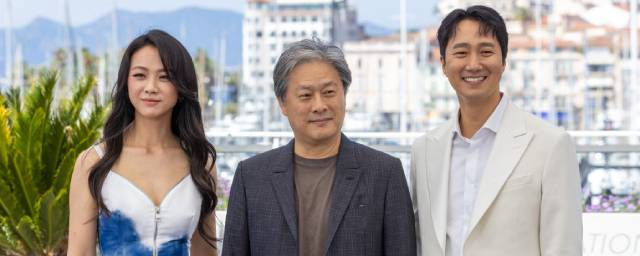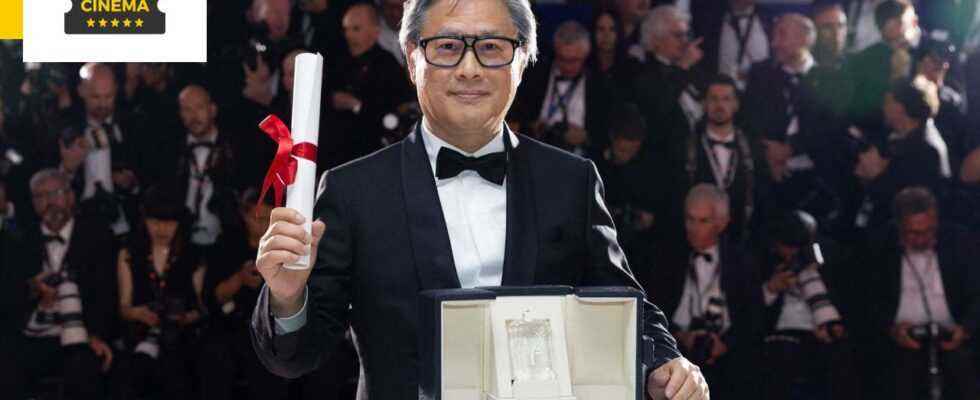18 years after “Old Boy” and its Grand Prix, Park Chan-wook left the last Cannes Film Festival with the Directing Prize for “Decision to Leave”, in theaters since Wednesday. A look back at the career of this major director of Korean cinema.
He is one of the filmmakers, along with his compatriots Kim Jee-woon (I met the Devil) and the Oscar winner Bong Joon-ho, who participated in the revival of Korean cinema nearly twenty years ago and enabled it to export itself beyond the borders of the peninsula, to the point of establishing itself as one of the most dynamic and stimulating industries in the world cinematographic landscape. Park Chan-wook is back with Decision To Leave, a variation around the figure of the femme fatale, in which an investigator succumbs to the charm of his main suspect.
Complicated beginnings
If he is now a key figure in Korean (and world) cinema, everything had not started under the best auspices for him. Passionate about cinema from an early age, it is nevertheless in philosophy that he obtained his diploma. The son of an architect, he was destined for a career as an art critic, before embarking on directing in 1992 with The Moon Is… The Sun’s Dream, a gangster film set in Busan.
This first feature was a bitter failure and the aspiring filmmaker turned to film criticism in 1994. He published a collection of his articles before retrying the experience of directing in 1997 with Trio, a comic portrait of three outlaw characters. There again, he faces a flop and gives himself one last chance to break through as a director.
A first great popular success
Fortunately for him, the third try will be the good one. In 2000, the thriller JSA (Joint Security Area) attracted more than five million spectators in South Korea and remained one of the biggest successes at the national box office. The film, recounting an investigation into a murder perpetrated on the Bridge of No Return, on the border of North Korea and South Korea, is as ambitious in its form as in its substance. It is one of the very rare productions at the time which also directly evokes the relations between the two territories.
The Revenge Trilogy
2002 is a key year for the filmmaker who manages to materialize a long-standing project: Sympathy for Mr. Vengeance, the descent into hell of a man who kidnapped a little girl in the hope of treating her sister with the money. ransom.
Film Tray Old Boy (2004)
A year later, he continued on the theme of revenge by adapting the manga old boy with Choi Min-sik in the lead role. Selected in Competition at Cannes (the year in which Quentin Tarantino was President of the Jury), the film won the Grand Prix and dedicated the director to the international scene. The story of this kidnapped man, imprisoned for 15 years and then released for no apparent reason, allowed Old Boy to quickly establish itself as a cult film.
After having signed one of the segments of the 3 extreme triptych, in 2005 he completed his “revenge trilogy” with Lady Vengeance, centered this time, as its title indicates, on a female character. Accused of the murder of a little boy, the heroine sets out to take revenge on her release from prison. A violent work imbued with an incisive black humor that reveals all the talent of the filmmaker.
A bloody adaptation of Emile Zola
He tried his hand at a lighter register in 2007 with I am a cyborg, a wacky and melancholy love story between two patients in a psychiatric hospital. A film that he describes himself as “breath of fresh air” between his various projects and which earned him a distinction at the Berlinale with the Aflred Bauer prize for the most innovative film in the selection.
10 South Korean films to (re) see absolutely
In 2009 was released on our screens Thirst, this is my blood, a daring re-reading of Therese Raquin by Émile Zola with… vampires! We follow the forbidden romance between a priest who has become a creature of the night and his friend’s wife. He is directing his favorite actor Song Kang-Ho there for the fourth time. The feature film won the Jury Prize at the 62nd Cannes Film Festival.
Internationally sought-after talent
Three years later, the Korean went to the USA for the first time with Stoker. He directs in this family thriller, written by Wentworth Miller (the Michael Scofield of Prison Break), Nicole Kidman and Mia Wasikowska. In 2016, he returned to his native Korea with the sulfurous Mademoiselle, adapted from novel by British author Sarah Waters, At your fingertips
Although he left the Cannes Film Festival empty-handed, where the film was in official competition, the director returned the following year to the Croisette as a member of the jury, chaired by Pedro Almodovar and alongside Will Smith and Jessica Chastain. In 2018, Park Chan-wook rubs shoulders with a new format with the British spy mini-series The Little Drummer Girl, worn by Alexander Skarsgård, Florence Pugh and Michael Shannon.
Back to basics
Since June 27, it has been back in French theaters with Decision To Leave, a romantic thriller in which a detective falls in love with a widow whom he suspects of the murder of her husband. Devoid of the shock scenes to which the director has accustomed us, this film seems to mark a lull in his style. He calls it a “adult movie. Instead of telling a story of mourning as a tragic event, I sought to evoke it with subtlety, elegance and humor, in a way that will touch adults. »

CYRIL MOREAU / BESTIMAGE
Tang Wei, Park Chan-wook and Park Hae-il at the “Decision To Leave” photocall during the 75th Cannes International Film Festival on May 24, 2022.
It is however a return to the sources for Park Chan-wook, who here pays homage to the one who influenced him and pushed him to make cinema: Alfred Hitchcock. It is indeed during the viewing of Cold Sweats at a student party that he discovers his vocation. A projection all the more important as he meets there the one who will become his wife.
Like James Stewart’s obsession with the mysterious Kim Novak, Park Hae-il plays a conscientious Korean detective who begins to follow and observe the main suspect in his case, a Chinese widow (Tang Wei) who seems unaffected by the death of her husband. His shadowing turns into a game of seduction and their interrogation sessions become mock trysts.
If Decision To Leave did not allow Park Chan-wook to win the Palme d’Or at the last Cannes Film Festival, where the film was in official competition, this regular on the Croisette nevertheless left with the Prize for stage. “I wanted to make a film that could seduce the viewer and captivate him in a progressive and almost imperceptible way”. Successful bet.
The Decision To Leave trailer, in theaters now:
